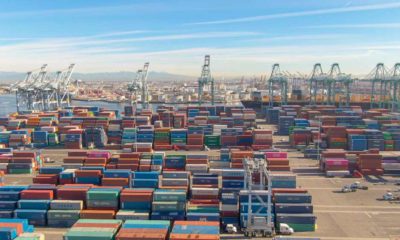Uncategorized
What Will It Take To Strengthen Turkey’s Economy?
A Brief History of Modern Turkish military coups
After the Turkish coup of 1960, the late 60s and early 70s were defined by a harsh economic downturn nationwide.
The economy stagnated, and the inflation rate reached almost 80%, leading to protests by workers’ groups and right-wing attacks.
In 1971, the military intervened again, in an attempt to restore order after it had claimed the current government had allowed the government to plunge into anarchy.
The Turkish military, over the decades, has seen itself as obligated to protect peace in anarchy in the often socially and economically unstable country.
However, even after the 1971 coup, instability continued.
In the 1970s, the Turkish prime minister changed eleven times, and the economy continued to stagnate.
Military rule continued, resulting in many executions and disappearances before a new constitution was put to vote in 1982.
In 1997, the year of the next military coup in Turkey, a year had passed since the Islamist Welfare party took power, helped by the 1995 elections.
The 1997 coup was not quite a military overthrow; many have called 1997 a “postmodern coup.”
This is because the military did not use physical force, but it used intimidation while issuing a series of “recommendations” which the government had no choice but to accept.
The result of these recommendations was the secularization of many aspects of Turkey, with mandatory non-religious education programs, headscarf bans, and the banning of P.M. Erkaban from politics for five years.
The Islamist Welfare Party was shut down, with former members (including current P.M. Erdogan) going on to form the Justice and Development Party.
Since then, the government has been relatively stable and democratically elected.
[ms_divider style=”normal” align=”left” width=”100%” margin_top=”30″ margin_bottom=”30″ border_size=”5″ border_color=”#f2f2f2″ icon=”” class=”” id=””][/ms_divider]
[ms_featurebox style=”4″ title_font_size=”18″ title_color=”#2b2b2b” icon_circle=”no” icon_size=”46″ title=”Recommended Link” icon=”” alignment=”left” icon_animation_type=”” icon_color=”” icon_background_color=”” icon_border_color=”” icon_border_width=”0″ flip_icon=”none” spinning_icon=”no” icon_image=”” icon_image_width=”0″ icon_image_height=”” link_url=”https://offers.thecapitalist.com/p/warrenbuffet/index” link_target=”_blank” link_text=”Click Here To Find Out What It Said…” link_color=”#4885bf” content_color=”” content_box_background_color=”” class=”” id=””]Warren Buffett Just Told His Heirs What He Wants them To Do With His Fortune When He Dies. [/ms_featurebox]
[ms_divider style=”normal” align=”left” width=”100%” margin_top=”30″ margin_bottom=”30″ border_size=”5″ border_color=”#f2f2f2″ icon=”” class=”” id=””][/ms_divider]
Potential Economic Impacts of an unstable political climate
Most of the Turkish coups of the past few decades were defined by the wholehearted support of the military and thus, their overall strength.
That trend was broken in last week’s coup, with only parts of the military (and seemingly, not the most important military leadership) supporting the coup attempt.
However, the trend of economic downfall following the coup is not likely to be broken this time around.
It is a tried and true economic rule that political instability, coups, and potential civil war is bad for business.
Investors pull out their stock in the country, fearing turmoil, and new investors are likely to turn elsewhere.
Although this coup was unsuccessful, it will likely have big implications for Turkey’s economy.
Comparing Turkey and Egypt
Instead of with its own coups of the past, it may be more telling to compare Turkey’s recent coup with the recent Egyptian uprising which landed Mohamed Morsi in jail and Abdel Fatah al-Sisi in the role of president.
Like Turkey, in Egypt, the fight was the military versus democratically elected Islamists.
In contrast, the Egyptian coup was also backed by the entire military, as well as being in response to the Islamists’ failure to fix their country’s urgent economic problems.
This is very different from what happened in Turkey.
The Economy and the Coup
In Egypt, the elected Islamists put economic development on hold.
Instead, they focused on implementing the goals of their political agenda, such as making the constitution more religious, and making the president more powerful and the judiciary weaker.
In Turkey, the picture was much different.
After the Islamists were elected in 2002, they put the needs of the economy before their political goals.
The results of the Islamists’ attempts to bolster the economy in Turkey were an inarguable success.
Fiscal discipline was encouraged, and foreign investment was attracted.
Erdogan’s government saw a decrease in inflation from 32% to less than 10%.
The debt to GDP ratio fell from 74% to 32%.
All of Turkey’s debts to the International Monetary Fund were repaid, and the gross domestic product grew by 7% compared to before 2008.
Turkey’s manufacturing prowess also increased since Erdogan’s election.
Why Turkey’s Coup Failed
The coup failed because the people, overall, were happy with the Islamist government they had elected.
In the past decade, quality of life increased substantially.
Turkey’s current per-capita income rests at $10,500, which in an astonishing three times higher than a decade ago.

Levels of extreme poverty fell from 13% to 4.5%, and moderate poverty levels fell from 44% to 21%.
Because of this, the vast majority of Turkish people think of Erdogan very positively and link his governance directly to the results they are seeing in the improvement of their day to day lives.
There was a huge misalignment between the perceptions of the army and the perceptions of the people.
The army thought the people were dissatisfied with the government too.
They hoped that they would take to the streets and help the coup like the Egyptian people did in their recent coup.
However, the exact opposite happened.
They took to the streets, yes, but to act against the coup and to protect the government they had elected.
Then why did the coup happen in the first place?
Recently; Erdogan actually had begun to further his political agenda with the same kinds of practices that led to the Egyptian revolt.
He tried to empower the presidency and to take power away from the judiciary.
He wanted to change the constitution, and he also infringed on the rights of the media, police, and military.
This is what caused the alienation of some people and led to the revolt.
However, the majority did not agree with this feeling of the minority.
Essentially, Erdogan has angered the elites, but he has the trust and support of the majority.
However, this is only so long as Turkey remains economically secure, and this is seeming less and less sure as time goes on.
Especially with a new attempted coup, the economy could certainly get shaky.
Turkey is strongly impacted by others’ nearby political turmoil
First, Turkey was impacted by the global recession.
It came out overall, okay.
The Arab civil wars, on the other hand, have wreaked havoc on Turkey both socially and economically.
The Syrian civil war has caused Turkey’s closest neighbor to flood Turkey with over 3 million refugees.
Rockets were fired into Turkey, the Assad’s Russian sponsor led an all-out boycott against Turkey’s markets, leading to economic damage.

Turkey lost Russian customers and tourists, and the refugees placed a huge strain on the labor market.
Even more harmful, the Islamic State aimed many of its terror efforts at Turkey, which endangered locals and seriously hurt the tourism industry (this makes up a full 10% of the nation’s gross domestic product).
The Complex Kurdish Conflict Leads to a Two-Front War
The Kurdish minority group in Southeastern Turkey is in strong disagreement with Erdogan for a variety of reasons, including:
- Many believe Erdogan has Kurdophobia, and is racist against Kurds
- He consistently calls Kurdistan Workers Party and other Kurdish groups “terrorists”
- Kurdish leaders want a level of self-governance; which Erdogan has denied them by claiming they are trying to break away from Turkey
- Erdogan rejects the potential for diplomatic solutions, resorting only to all-out war against the Kurds and anger at U.S. diplomats who have visited Syrian Kurdish sites.
Over 40,000 people have been killed in the conflict between the Kurds and the Turkish government.
Attacks by Kurds and by the Islamic State, although coming from very different reasons and perspectives, have led to an incredible amount of instability.
Economic impact of two fronted instability
The tourism industry dropped 28% in revenue in the month of April alone, reflecting a change in global perception of the overall security of the nation.

The World Bank has noted that the economy is increasingly relying on internal consumption.
The prediction of debt for 2017 is that the national deficit will account for over 5% of the national GDP.
When Erdogan took office, he eased these strains by increasing domestic spending and improving foreign relations with Israel and with Russia.
He increased the minimum wage to try to stimulate the domestic market and offering corporate subsidies to attract investment and development.
Even though these measures have helped the domestic economy, it is very unlikely that they can do anything at this point to change the global perception by investors of Turkey’s security.
It is even less likely that the perception of foreign tourists will change, especially after the coup and the recent Ataturk airport bombing have garnered so much media attention.
Although in the past decade foreign direct investment has increased substantially, the amount of money flowing out of Turkey has doubled since its rate ten years ago.
The reason for this is simple.
Yes, Turkey is perceived globally as a terrorism target, but so is most of the rest of the Western world.
The major problem is that, in the eyes of global investors, Turkey is seen as being in the throes of civil war, the Kurds versus the government.
If peace is not soon established with the Kurd’s, it is possible that the economy will stagnate, Erdogan could lose the support he has built with the masses, and even more instability will follow.















